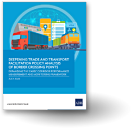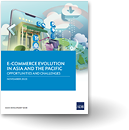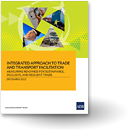Spotlight Archives
- ADB Working Paper Series on Regional Economic Integration No. 119 - Learning by Exporting: Evidence from India4 October 2013Apoorva Gupta, Ila Patnaik, and Ajay Shah used data for Indian firms to find evidence for self-selection of more productive firms into exporting but not for post-entry increase in productivity. Read more.
- ADB Working Paper Series on Regional Economic Integration No. 117 - What is Economic Corridor Development and What Can It Achieve in Asia's Subregions?Jul 2013Hans-Peter Brunner characterizes economic corridor development by presenting good practices with an overview of cases and experiences. This helps to advise policy makers on policies and interventions, which augment regional development impact. Read more.
- ADB Working Paper Series on Regional Economic Integration No. 115 - The Role of International Trade in Employment Growth in Micro- and Small Enterprises: Evidence from Developing AsiaAugust 2013Jens Krueger examines the role of international trade in employment growth, focusing on micro- and small enterprises in six Southeast Asian countries. He finds that participation in international trade boosts firm-level growth by 3% per year on average. Read more.
- ADB Working Paper Series on Regional Economic Integration No. 116 - Impact of Eurozone Financial Shocks on Southeast Asian EconomiesAugust 2013Jayant Menon and Thiam Hee Ng explore the direct impacts of a further shock to the eurozone on Southeast Asia using the Global Vector Autoregression Model. Their findings confirm the need to improve regional safety nets. Read more.
- ADB Policy Brief No. 5 - Impact on Asian bond markets from tighter US monetary policyAugust 2013OREI Policy Brief analyzes the repercussions to Asia's bond markets following remarks that US could start tapering its quantitative easing program. While raising funds through foreign currency bonds may become more difficult, the impact on local currency bonds issuance is more limited. Read here.
- Services Trade Liberalization toward the ASEAN Economic Community (18 July, 10:30-12:00 Manila time)Jul 2013Pierre Sauvé of World Trade Institute, Geneva, will speak about the role of services trade liberalization in the ASEAN Economic Community, 18 July, 10:30 AM- 12:00 NN, Auditorium A, ADB Headquarters, Manila. Register with Liza Cruz or watch live webcast.
- RCI Information Pack July 2013Jul 2013The monthly RCI Information Pack covers news and events on regional cooperation and integration (RCI) in Asia and the Pacific. It also includes monetary, financial, and trade indicators that monitor links between the region's economies and major external partners. Data used are available for download.
- ADB Working Paper Series on Regional Economic Integration No. 114 - The People's Republic of China's Financial Policy and Regional Cooperation in the Midst of Global HeadwindsJun 2013OREI Head Iwan Azis investigates the impact of PRC's new direction of financial policy which warrants a slower but more sustainable growth. The rest of Asia needs to adjust to this new normal, and strengthen the safety nets. Read more.
- Pacific Economic Monitor July 2013Jul 2013This edition of the Pacific Economic Monitor updates 2013 and 2014 GDP growth and inflation projections for ADB's Pacific developing member countries. The theme of the policy briefs included in this issue is regional cooperation and integration. Read more.
- RCI Information Pack June 2013Jun 2013The monthly RCI Information Pack covers news and events on regional cooperation and integration (RCI) in Asia and the Pacific. It also includes monetary, financial, and trade indicators that monitor links between the region's economies and major external partners. Data used are available for download.




